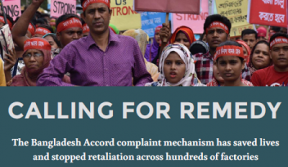In Peru, more than 70 percent of the asparagus fields’ workers are women, and the majority of these are between 18 and 25 years of age (Amat 2006; Jara 2007). What was previously mentioned seems to portray that the Peruvian market of asparagus pleasingly wishes to open its doors to women, offering them opportunities with ‘never-ending’ possibilities. At the same time, the Peruvian asparagus industry discloses that it feels forced to provide `quality, innocuity and security' in its products. Based on that comment, one should wonder the following: Do both the security and quality of the work environment that these women receive have any importance whatsoever?
A woman worker explained to researchers: “They say they pay us 18 soles, including overtime. Seventeen or 18 soles aren’t enough, when breakfast costs more than five soles, lunch about eight soles, and a worker can’t live on just bread and milk…and for clothing? And if you get sick, how will you buy medicine?” (Oxfam GB 2005, 5).
Do you believe that a person can live with dignity and provide food to her household with that money? I doubt it. In addition, many of these women are the only source of income to their homes because of different circumstances. Furthermore, many state the asparagus industry prefers to offer jobs to women for the simple fact the latter is willing to enter and leave the labor market based on the season. Also, others comment that the tasks required by the industry favors skills considered ‘feminine’, such as motor abilities and meticulousness. Nevertheless, I strongly believe the asparagus industry prefers women by the simple fact that is easier to exploit them than me, for a logical reason; this reason being that men could physically retaliate.
What was addressed above is only one of many problems these women workers must confront daily. One could continue analyzing many problems, such as the treatment to pregnant workers, the lack of breaks, and the incorrect payment of overtime, but I do not believe that it is necessary at the moment. However, what must be agreed is that this treatment to woman workers of the asparagus industry must be modified and improved quickly. To know more about conditions for women workers in Peru, please feel free to look a report written by ILRF's Nora Ferm.


Comments
re: The Abuse of the Peruvian Women in the Asparagus Industry
well to see this